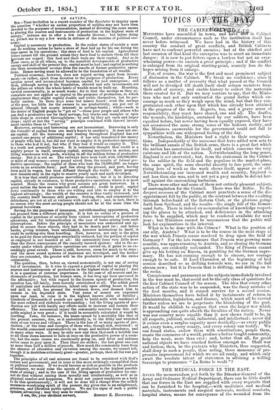THE CABINE
MrtusrEns have assembled in town,anti
IPAIRin Cabinet Council, under circumstances such as the institution itself has never before witnessed. We have had in the history of this country the conduct of great conflicts, and British Cabinets have met to confront powerful enemies; but at the chiefest and last occasion of that kind the enterprise was to avert an immediate danger : it is now to put fetters upon a lawless but not an over- whelming power—to sustain a great principle ; and if the conflict is enlarged from its original starting-point, scarcely less do the hopes arising from it enlarge.
For, of course, the war is the first and most prominent subject of discussion in the Cabinet. We break no confidence ; since it follows as a matter of necessity that what passed at the Council will not be divulged till death itself shall release members from their oath of secrecy, and enable history to collect the materials there created for it. But we may venture to say, that the Minis- ters who met not only confronted the grand duties which en- courage as much as they weigh upon the mind, but that they con- gratulated each other upon that which has already been attained an the progress of the war. Regrets, too, and a grave sense of responsibility, they must have shared, one and all. The deaths, the wounds, the hardships' sustained by our soldiers, have been equalled before, but never having been equally exposed, they have not occasioned the same strong sense of the .hideous reality, and the Ministers answerable for the government could not fail to sympathize with one widespread feeling of the day. Nevertheless, the Ministers had a right to their congratula, tions. Independently of the successes that have added new acts to the brilliant annals of the British arms, there is a great fact which the nation has ascertained for itself, and which concerns the very existence and life of the nation. Notwithstanding the long peace, England is not enervated ; but, from the statesman in the Cabinet to the soldier in the field and the populace in the marketplace, the same spirit, the same cheerful alacrity to face peril, the same rising love of work as the work shows itself, appear as of old. Notwithstanding our increased wealth and security, England is not less than she was, and is not yet a prey unable to defend her- self against the encroaching barbarian.
There were other and some of them not entirely pleasant subjects of contemplation for the Connell. There was the Baltic. To the deepest recesses of the Cabinet must penetrate a sense of the dis- appointment felt by the public, at the contrast between the exulting triumph beforehand at the Reform Club, or the glorious going- forth from Spithead, and the results—the single fall of the Bomar- sund forts. There is indeed an accumulation of knowledge respect- ing the places to be attacked, and deficiencies in the attacking force to be supplied, which may be rendered available for next year ; but Ministers cannot be unconscious that the public will look for explanations in the interval. What is to be done with the Crimea ? What is the position of our ally, Austria ? What is to be the course in the next stage of the war which Prussia seems resolved to drag upon the field of Germany ? For the late rumours that Prussia was growing more sensible, was approximating to Austria, and so closing the German question, are evidently unfounded. The King of Prussia cannot give up his betting on Russia, in gambling for the German supre- macy. He has not eunninc,.. enough to be sincere, nor courage enough to be safe. If Lord Clarendon at the beginning of last session described us as drifting towards war, we are in the full stream now; but it is Prussia that is drifting, and drifting on to the rocks.
Conspicuous and paramount as the subjects immediately involved in the war must be, that could not be the only class of questions for the first Cabinet Council of the season. The idea that every other action of the state was to be suspended, was the fussy mistake of the first months and it cannot survive for a second session. i Misters themselves have belied it by instalments of reform in administration, legislation, and finance, which must all be carried further unless we are to perpetuate the blundering of the past. It would be childish to suppose that even the larger war which is approaching can quite absorb the faculties of the nation. Never was our country more capable than it now shows itself to be, in all respects, political, social, industrial, and intellectual ; never did it evince even a surplus capacity more decidedly,—as every public act, every town, every county, and every colony can testify. We can found states, endow them with constitutions people them, create the commerce of a world, produce a better. taught community, help the weak, more than ever ; and, better than all, for great national objects we have crushed faction amongst us. Shall war and faction, then, be the pretexts why Ministers, thus supported, shall deny to such a people, thus acting, those measures of pro- gressive improvement for which we are all ready, and which only await the resolute intent of statesmen in advising a willing Sovereign to pronounce "La Reim le veult "?


























 Previous page
Previous page